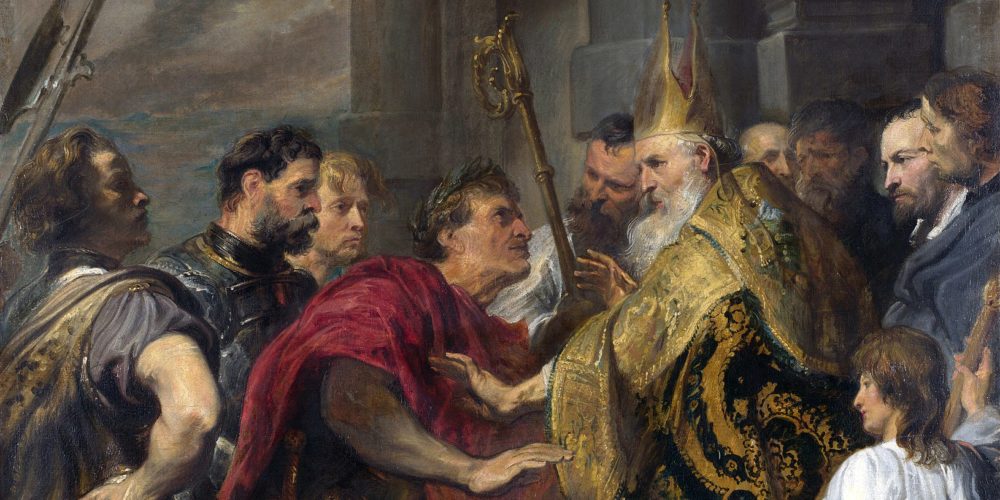
Published June 21, 2021
Countermoves (Carl F.H. Henry Institute for Evangelical Engagement)
An intense discussion about Catholic Bishops drafting guidance that would prohibit Catholic politicians who support abortion from receiving the Eucharist in a Roman Catholic service has arisen in recent media reports. While I, as a Baptist, have no intention of litigating the inner workings of Catholic theology concerning the Eucharist, the occasion provides an opportunity to reflect on the role of discipleship and discipline related to public officials who profess to be Christians. This episode puts President Biden’s adamant pro-choice stridency in focus, and deservedly so.
Before analyzing the particular circumstances, it’s important to put this conversation in the context of how we have come to conceive of religion and politics. This conversation is complicated because, as late moderns, we tend to separate religion and politics into hermetically distinct spheres. That is not how premodern societies thought, nor is it biblical. Premodern societies understood that all of life was imbued with religious significance. The very notion of how one would orient themselves to the world would come from a religious premise. In the same way, Christians are to extend Christ’s Lordship over every sphere of their life (1 Cor. 10:31). The rise of the secular mindset, however, has conditioned both broader cultural conditions, and even some Christians, to forge a dichotomy between a private religious orientation and an outward public life. As a result, we have a context where incorrect interpretations of the First Amendment have furthered this dichotomy, reinforcing the divide between religion and politics. What a faithful rendition of the First Amendment introduces, instead, is a bifurcation between the institution of the church and the institution of the state. Religion and politics, in contrast, cannot be separate. Religion is a meaning-making enterprise, which necessary spills over into the political.
One way we can think about this question of disciplining Christian magistrates who violate both Scripture and natural law is to go back to church history. When the Roman emperor Theodosius responded to a small insurrection by massacring thousands of citizens, Ambrose, the Bishop of Milan, withheld the emperor’s right to participate in the corporate gathering and the Eucharist until he would repent of his sin. Despite the negative perception of Ambrose’s actions from the emperor’s supporters, Theodosius yielded to Ambrose by publicly repenting of his sin, and he was restored to fellowship. The so-called “secular” was brought under the sway and influence of the “religious,” as it were. The sin in question was not discrete or sectarian but squarely within the jurisdiction of how magistrates are called to govern—with justice.
When we look at this instance of Ambrose calling Theodosius to repentance, this provides a clear example of how to think about the current moment related to the Catholic Church’s considerations to prohibit abortion-supporting Catholic politicians from receiving the Eucharist.
Perhaps the first thing we should ask is, “Does an ecclesial body have the rightful authority to do this, and is it right to exercise such authority in this particular instance?” The answer is a resounding yes to both. On the first question, where an ecclesial body has spoken and spoken so that negative consequence follows from violating its authority, it has the explicit power to call those under its jurisdiction to live by its teachings. This is a matter of commonsense and basic theological coherence. Doctrine requires assent. But when a representative of the ecclesial body flouts its doctrine and ethics, of course, the ecclesial body would call its members to recant. On the second, the Roman Catholic Church is particularly correct to apply such discipline since the issue at stake, abortion, violates the most basic moral principle: Preserve life. Flagrant violation of explicit Christian teaching should be met with a grave consequence (1 Cor. 5:7).
This episode allows us to recapture the fundamental truth that religion should be totalizing in one’s life if it is to be authentic. The Scripture posits no divide between the private, individual Christian and the Christian engaged in public life. Both are subject to the discipline of the church. This doesn’t mean that there’s a Christian consequence to every political issue under the sun. The Christian legislator who, for example, votes for or against a carbon tax should not be subject to discipline. Still, it does mean that on essentials, such as the preciousness and sacredness of life, a politician who purports to be a Christian makes the opposite declaration of who they purport to be when they support abortion. You cannot be a Christian and stubbornly support abortion. That may upset some, but so be it. Lines must be drawn somewhere, and the sanctity of unborn life seems more than appropriate to determine whether someone should receive the right hand of fellowship.
On the surface, this episode involving the Bishops and legislators appears controversial. It is only controversial because the default setting of our society is to praise politicians who offend doctrinal conservatism and praise them for doing what accords with the liberal zeitgeist while expressing outrage at church bodies that would dare to take chasten the disobedient. In truth, however, this episode is not complicated because when we think about the relationship between religion and politics, a critical middle is often missing in our analysis of the issue at hand. That is the subject of ethics.
The journey from religious foundation to political application requires us to think about ethics and moral action from immoral action. Legislators who profess to be Christians but brazenly contradict what Christians believe concerning unborn life represent a repudiation of biblical ethics. Winking and nodding at a legislator’s highhanded rebellion signals disbelief in the church’s doctrine and a concession to the demands of modernity. Church discipline, biblically speaking, offers an antidote to this lackadaisical understanding of church polity. Church discipline is corrective in that it hopes to restore the believer to proper fellowship by not allowing their corrupting influence to metastasize.
Any abortion-supporting politician who professes to be a Christian should be subject to the disciplining regulations of their respective ecclesial bodies. Such should be the case wherever there is flagrant, public, unambiguous, and unrepentant sin. One of the reasons this is such a scandal is that we have allowed nominalism to guide our understanding of what it means to be a Christian engaged in politics. There is no middle ground for nominalism. There is no third way. To be a Christian is to be a Christian in all aspects of one’s life, even if you’re a politician. To purport to be a Christian politician who can believe and advocate for things contrary to the Christian faith is a complete repudiation of what it means to be a disciple of Jesus Christ.
This gets us to the most critical aspect of this discussion. When Christians declare that politicians who claim the mantle of “Christian” should be held accountable by their ecclesial bodies for voting for policies that scandalously violate Scripture, natural law, and the common good, we are saying something important about the integrity and coherence of our confessional beliefs.
We are saying that there is a higher authority than the Constitution. There is a higher authority than what pure consensus, convention, or political majorities declare right. Because Jesus Christ is Lord, and because legislators who are Christians purport to acknowledge Jesus Christ as Lord, their loyalty and obedience are due supremely to Christ more than political parties or party platforms. If so-called “Christian” politicians support patently anti-Christian policy goals, they should be honest with themselves and either repent or quit calling themselves Christians.
Therefore, we should commend the Roman Catholic Bishops who would advocate for such disciplinary action. This is not political. It is a confessional matter. Disciplining wayward politicians should have been a practice that the Roman Catholic Church has been exercising since America’s founding. Such should be said of all ecclesial bodies. Our sitting President, Joseph Biden, purports to be a Catholic, and in his day-to-day activities, evidences a serious ritualistic commitment to his faith. But that is not enough. He has been at the vanguard of liberalizing Catholicism in America. But piety to the neglect of doctrine is a recipe for nominalism. To purport to be a Catholic while denying the sum and substance of so much Catholic moral teaching undermines the credibility that one’s faith bears any resemblance to its doctrine. This is the essence of liberalism: Harness the performative ritual at the expense of the doctrinal.
Just as Ambrose reminds us, the magistrate’s actions cannot be excised from who he or she is as a congregant within an ecclesial structure. A politician is accountable for how their actions as a magistrate either conform or stray from the authority structure for whom they are ultimately accountable.
For far too long, religious bodies have been willing to turn a blind eye to their legislators’ voting indiscretions. To be Christians means for us to be committed to how we vote and holding those accountable who say they are of us for how they vote, too.
EPPC Fellow Andrew T. Walker, Ph.D., researches and writes about the intersection of Christian ethics, public theology, and the moral principles that support civil society and sound government.








